- Ex-cop’s changes testimony about when he saw Exeter’s gun
- Defence says ex-cop weaving a ‘web’ of lies
- Arresting officer says Exeter ‘was not legally arrested’, then changes statement
- Defence raises question about witness’ relationship to PM
Granville De Freitas, one of the two police officers who took opposition politician Ben Exeter to the Central Police Station after his arrest in Kingstown last December, has resigned from the Police Force and has become a fisherman.
De Freitas, who has accused Exeter of striking his hand against a parked vehicle during the arrest, causing actual bodily harm, testified in the case at the Kingstown Magistrate’s Court on Monday.
During cross-examination, he told defence counsel Kay Bacchus-Browne that he resigned from the Police Force in March but denied that he was fired for dishonesty.
Lead prosecutor in the case, Assistant Director of Public Prosecutions, Colin John, objected to Bacchus-Browne’s line of questioning, triggering the first of several intense exchanges between defence and prosecution that day.
“Is it a fact that you resigned or you were fired? Which one?” Bacchus-Browne asked De Freitas, who said he quit the constabulary after six years.
“I resigned,” De Freitas said.
“Isn’t it more the truth, officer, that you were fired for dishonesty?” Bacchus-Browne said.
De Freitas said this was not the case.
“I am putting it to you that you were fired for dishonesty,” Bacchus-Browne said.
At this point, John rose, saying: “Your Honour, … I hope that counsel would be bringing the evidence to support what she is putting to the witness.”
The magistrate, Bertie Pompey, asked Bacchus-Browne about evidence, and she responded, saying to let the witness answer the question.
The magistrate noted that the witness had said he had not been fired for dishonestly, and Bacchus-Browne said, “Fine.”
Bacchus-Browne went on to say that she has to test De Freitas’ reliability and that it is quite in order for her to ask him if he was fired for dishonestly.
But John rose again, saying, “Your honour, asking the witness is one thing, when you put something–”
Bacchus-Browne, responded, “I am still speaking. You have no right to stand up when I am speaking to the magistrate. Wait until I am finished.”
John then took his seat and Bacchus-Browne completed her explanation about establishing the witness’ credibility.
“And that is why I am questioning him. If he says no — I understand why counsel is anxious to jump up and down. I understand his anxiety, but wait until I am finished before he do it.”
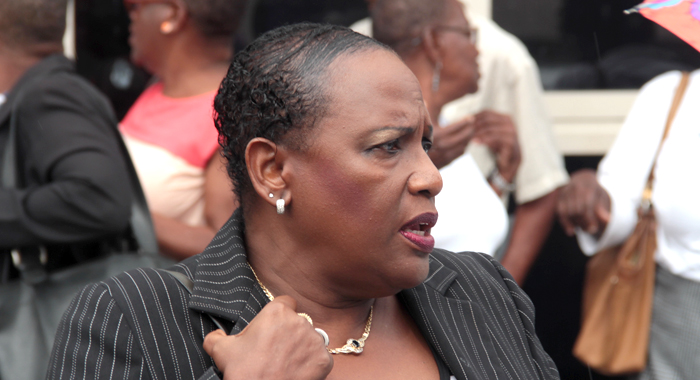
‘Please stop muttering!’
As Bacchus-Browne continued with cross-examination, John could be heard whispering.
“Please stop muttering! I did not interrupt when you were doing your examination-in-chief,” Bacchus-Browne said to John.
She then appealed to the bench, saying, “Your Honour, would you please talk to this DPP acting, assistant DPP? He does this every time I am on my feet. He is so afraid of my questions that he tries to interrupt me all the time. He doesn’t do it for anybody else. He reserves that special treatment for me.”
Another intense exchange between prosecution and defence came when Bacchus-Browne asked De Freitas about his relationship to Prime Minister Ralph Gonsalves.
“First or second cousins?” Bacchus-Browne asked.
“Your Honour, what the relevance of that question?” John said.
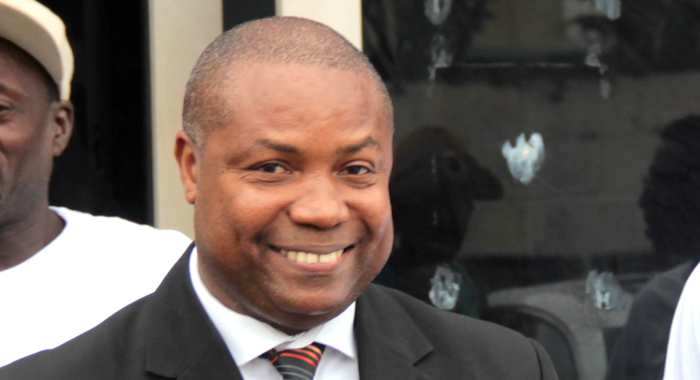
“What’s the relevance of that question? This is a highly political case. We have always said that this is a highly political case,” Bacchus-Browne retorted.
John, however, repeated his objection, asking if counsel was saying that once one is related to a person they cannot give testimony in a case.
“I am saying that we have always said from this side that this case is highly political. We have the officer saying he became disturbed because he saw Ben going to Dr. Gonsalves… So I am asking him if there was some particular interest he had in Dr. Gonsalves. And so I asked him if he is related to Dr. Gonsalves. Nobody else has given evidence like that. Nobody else. In other words, I am putting it to him that he is biased because he is related to Dr. Gonsalves,” Bacchus-Browne said.
“Is that so?” the magistrate asked De Freitas.
“No please, Your Honour,” the witness responded.
In response to Bacchus-Browne’s question regarding whether he is closely related to Gonsalves, De Freitas said that is not the case.
The charges
Exeter, who was the New Democratic Party’s (NDP) candidate for Central Leeward in the December 2015 general elections, was arrested in Kingstown on Dec. 29, 2015, where crowds of NDP and Unity Labour Party supporters had gathered as the ceremonial opening of Parliament was being held.
He is charged that on Dec. 29, 2015 at Kingstown, he assaulted Corporal 632 Morris, acting in due execution of his duty.
He is also charged that at the said date and time he resisted the arrest of Corporal 632 Morris, acting in due execution of his duty.
Exeter is further charged that he assaulted constable Granville De Freitas of Chester Cottage, causing actual bodily harm.
Exeter, who was the holder of a licensed firearm, is also charged with an offence relating to taking a firearm to a public meeting.
He is charged alongside NDP youth activist Shabazaar GunMonro George, 18, who was arrested at the same time.
George is charged that on Dec. 29, 2015 at Kingstown, he obstructed Corporal 632 Morris, acting in due execution of his duty and had in his possession an offensive weapon, to wit a zapper.
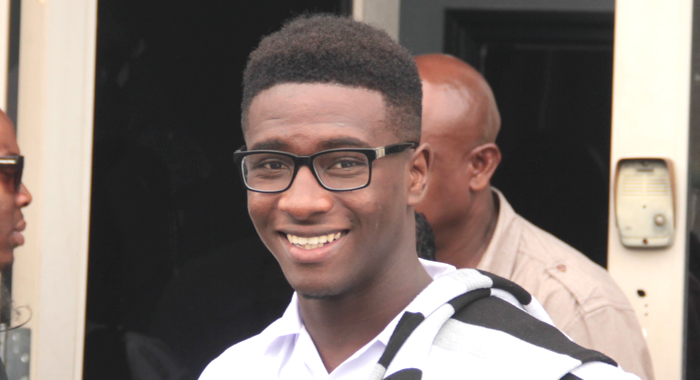
Ex-cop changes testimony
De Freitas, who lives at Chester Cottage, told the court that on the date in question, he was attached to the SVG Port Authority.
He was in uniform, along with other officers, who were providing security near the courthouse on Halifax Street, Kingstown.
The former lawman said he saw Exeter force his way through some police officers and further saw an officer stop Exeter.
De Freitas, however, said that he did not recognise the officer. He said he then saw Corporal 632 Morris stop Exeter then saw what appeared to be a firearm on Exeter’s waist.
De Freitas told the court that just before that, he heard the corporal say, “Boy, the man have a gun.”
And pulled away the firearm.
From all testimony by witnesses, the gun, a licenced firearm, was in a holster on Exeter’s waist.
De Freitas told the court that he saw the gun before Corporal Morris pulled it from Exeter’s waist but said he was not close enough to do anything.
He showed the court a distance of about 20 feet, which he said separated him and Exeter.
“While on duty there about 3:45 p.m., I saw Ben Exeter force himself through some police officers shortly after the Prime Minister arrived. Then a police officer stopped him and he was talking to him. Shortly after, I saw corporal 632 Morris approached him and pulled something that appeared to be a firearm from his waist,” De Freitas said.
Bacchus-Browne noted that in the statement De Freitas said he saw someone pulled what appeared to be a firearm from Exeter but told the court that he saw Exeter with a firearm after he passed through the crowd.
Grilled on this point, De Freitas said he wanted to change his statement to say he saw the gun before the corporal pulled it from Exeter’s waist.
But Bacchus-Browne told the witness that she was putting it to him that he did not see the firearm until the corporal pulled it from Exeter’s waist.
He said he was not close enough to do anything.
“I am putting it to you that you are telling a tissue of lies here. Web after web of lies and I am further putting it to you that you never saw that firearm until Corporal Morris pulled it out. Is that so or not,” Bacchus-Browne said.
After a pause, De Freitas said, “Your Honour, I saw the firearm before Corporal Morris pulled it out.”
“You never said that in your statement. I am putting it to you that you never said that in your statement to the police,” Bacchus-Browne said.
“Your Honour, it is not like that in the statement,” De Freitas said.
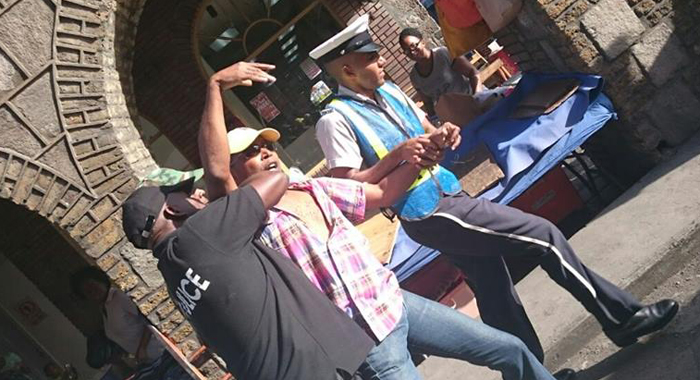
He said the corporal held on to Exeter and Exeter pushed away the corporal’s hand. The corporal held on to Exeter again, and Exeter pushed away the corporal’s hand, De Freitas told the court.
He said Exeter then gripped the corporal’s shirt collar with both hands, using his right hand first.
De Freitas said he then intervened and pulled Exeter’s hands from the corporal.
He said the corporal then informed Exeter that he would be reporting him for assaulting a police office and would be arrested him for the same offence.
De Freitas said as he and the corporal were taking Exeter to the police station, an individual came in front them and was taking pictures.
He said the person was walking backwards and the police proceeded to the station. De Freitas said he did not pay attention to the person, but remembers that it was a male who was dark in complexion.
At the Central Police Station, Exeter was taken to the Criminal Investigations Unit, where he handed over a magazine with ammunition from his pocket to the police. He was then taken to bathroom of the department and De Freitas, along with two other officers, searched Exeter, the former cop told the court.
Exeter’s properties were handed over to Assistant Superintendent of Police Francis, according to the witness.
De Freitas said he noticed that his hand was bruised from when it impacted against the parked vehicle. He went to the bathroom in the dormitory for about 15 minutes then reported “the matter” to the CID, who gave him injury forms to take to the District Medical Officer (DMO) for a medical examination.
He went to see the DMO, who wrote on the form and gave them back to him, De Freitas said, adding that he, in turn, returned the forms to the CID.
In her cross-examination, Bacchus-Browne asked De Freitas what, in his estimation, was the offence that led to Exeter’s arrest.
He said assault.
But Bacchus pointed out that Corporal Morris saw Exeter’s gun and ran up to him and grabbed it. She asked De Freitas if Exeter had given Morris permission to grab the gun.
De Freitas said that as a police officer one doesn’t need permission to do so.
“I have one. If you see me with it, would you grab it away from me? Are you saying that as a police officer, if you see me with my firearm you would come and grab it away from me? Is that what you are saying?” Bacchus-Browne asked.
“Your honour –” De Freitas said but did not finish his statement.
“Is that what you are saying officer. I mean, you are not an officer anymore. Mr. De Freitas. Is that what you are saying?”
De Freitas instead told the court that Exeter forced himself through some police officers.
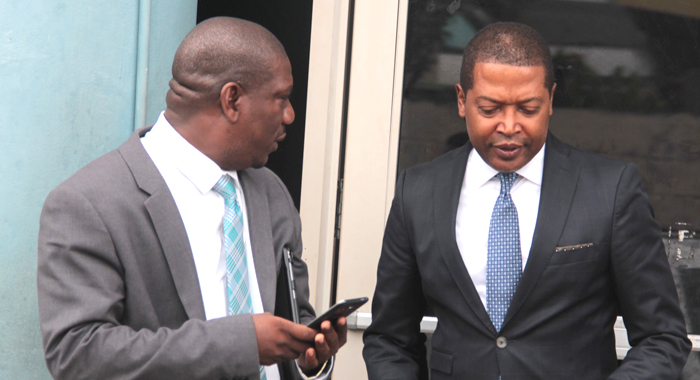
“So, forcing himself through the police officer, that was the offence in your estimation. As a green police officer of six years, was that the offence?” Bacchus-Browne said.
“Yes,” the witness replied.
“Tell us what the offence is.”
“Your Honour, that would depend on whether or not the officers that he forced himself through choose to report against him for assault.”
“I see. I see,” Bacchus-Browne said, and chuckled.
Bacchus-Browne asked De Freitas if a police officer illegally tries to arrest someone if that person has to go with the police officer.
“Your Honour, the defendant was not legally arrested,” De Freitas said.
“I know you are saying he wasn’t legally arrested and I agree with you.
“Illegally arrested. Sorry. He was not illegally arrested,” De Freitas said.
In response to Bacchus’s Browne’s question, he said a person does not have to comply with a police officer who is attempting to execute an illegal arrest.
In response to further questions, De Freitas said that the police officers were in a crowded demonstration and were standing “foot-to-foot” with the crowd, but added that if someone made a forceful step they would have gotten through the police officers.
He also told the court that Exeter forced his way through the police officers when the Prime Minister had just arrived and was about to take the salute.
“And at that point, Mr. Exeter left and that annoyed the police,” Bacchus-Browne said.
“He forced himself through a crowd,” De Freitas responded.
“Of course he went through a crowd. There was a crowd. Now you are speaking the truth. Please record what he said, Your Honour. I know the truth would come out. Mr. Exeter forced himself through the crowd.”
Bacchus-Browne told the court that it was the two officers who had assaulted Exeter and not the other way around.
The trial continues on June 20.




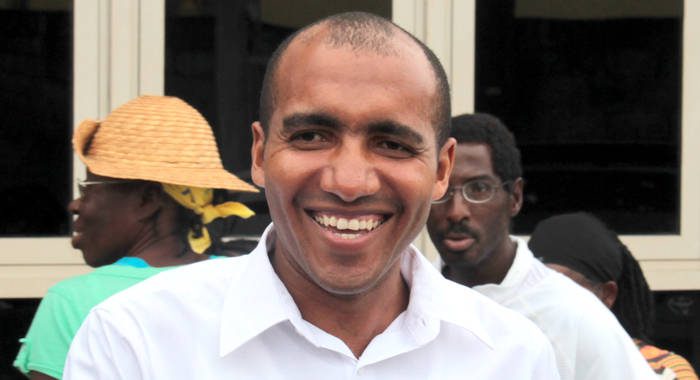


You have an inexperienced magistrate, an inexperienced assistant DPP, an inexperienced police prosecutor all of whom do not make one proper legal person between them.
Thank goodness that Ms Bacchus Browne can guide them all in how they behave and what correct court procedures should be followed.
I hope what I have written here is not construed as contempt of court. I do not mean to have contempt for the court only of the people who make up our judiciary. I just hope that ignorance and inexperience will not damage the outcome of this very silly matter and end up hurting Mr Exeter who is really an innocent party in the whole matter.
I still think this is a matter of malicious prosecution emanating from on high.